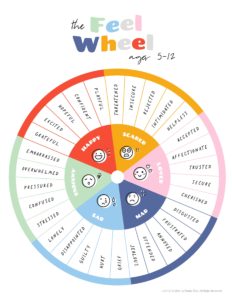“Mom, it’s just so sad. I can’t stop crying about it,” our youngest daughter sobbed. She’d just finished watching a movie based on a true story that had promised heartache with a hope-filled ending. It delivered all too well—on the heartache, at least. Our young teenager needed help processing her empathetic response and letting go of the grief that wasn’t really hers.
The part of the brain responsible for emotions fully develops around 25 years old. So, it’s no wonder teens need our support in learning how to be empathetic without taking on someone else’s emotional burdens. And while it’s easier to make that distinction when watching a movie, it takes more work in real-life situations. Give your teen these 4 tools to manage her emotional response if she’s prone to too much empathy.
1. Pay attention to your own emotions.
Adolescence is an emotionally turbulent time. Your teen might feel multiple emotions simultaneously or in rapid-fire succession as she processes through a moment or situation. It’s why many families find using a Feelings Wheel a go-to resource throughout the teen years. For example, your teen can use the
Identifying and labeling her own emotions can help your teen distinguish which emotions are hers (and why she is feeling them) and which emotions she has picked up from someone else. Not only that, a research study from the University of Rochester found the more specific a teen can be in labeling her emotions, the better protected her mental health will be. “Adolescents who use more granular terms such as ‘I feel annoyed,’ or ‘I feel frustrated,’ or ‘I feel ashamed’—instead of simply saying ‘I feel bad’—are better protected against developing increased depressive symptoms after experiencing a stressful life event,” explains lead author Lisa Starr, an assistant professor of psychology.
2. Focus on what’s yours to control.
Your teen isn’t responsible for other people’s choices, responses, or problems—only her own. That’s a key truth to teach your teen about emotional boundaries. By focusing on what she can control, your teen can manage her empathetic reaction in a healthy manner instead of expressing too much empathy. For example, she might become too emotionally invested in the ups and downs of her friend group. She could feel overly affected by tensions within the group that don’t directly involve her. However, she can’t force two friends to get along. She can only control how she treats them both.
Encouraging your teen to discern between what she can influence and what is beyond her control enables her to offer support and understanding without internalizing the emotional burdens of others. Plus, focusing on the controllable aspects of a situation empowers your teen to take positive actions without feeling overwhelmed by external circumstances. This proactive approach encourages resilience and fosters emotional well-being while still allowing for compassionate connections with others.
Encouraging your teen to discern between what she can influence and what is beyond her control enables her to offer support and understanding without internalizing the emotional burdens of others. Click To Tweet3. Visualize a glass wall.
Emotional borders require practice to spot and maintain. Teach your teen to think about an imaginary glass wall separating his emotions from someone else’s. The glass allows your teen to see and understand the other person’s emotions while maintaining separation. This protective shield helps distinguish between the emotions your teen observes and his own emotional space.
By envisioning this barrier, your teen can develop a sense of control over his responses, preventing him from becoming overly entangled in the emotional struggles of someone else and expressing too much empathy. Emotions can be observed but not absorbed.
4. Talk to a trusted adult.
Mom, we all want our teens to come to us first, and in many cases, they will. However, helping your child to identify other trusted and vetted adults she can turn to increases the likelihood that she will seek help if someone else’s emotions (or problems) exceed her capacity to handle them. Your teen’s list of go-to grownups could include her AP language teacher, the volleyball coach, or her small group leader. Or maybe it’s her best friend’s mom, her aunt, or the school counselor.
By guiding your teen to connect with other trustworthy adults, you empower her to foster a support network that can contribute significantly to her personal growth and well-being. At times, a teen might express too much empathy but she can never have too many adults in her corner. And, Mom, neither can you!
How do you support a friend who is going through a tough time? How do you like to be supported?










